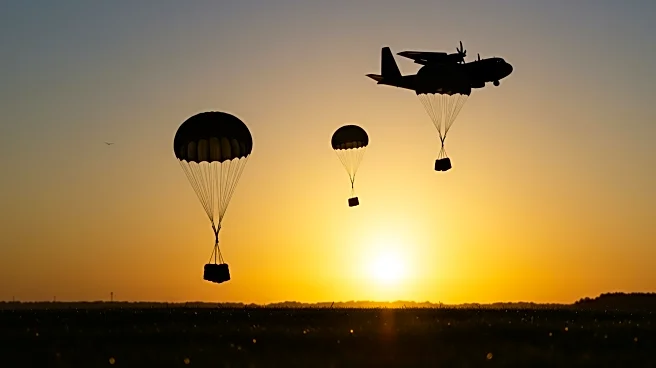What's Happening?
The Jordanian Air Force, along with several other countries, has been conducting airdrops of humanitarian aid in Gaza. This effort involves the delivery of essential supplies such as rice, sugar, and pasta to the war-torn region. The operation is part of a multinational air bridge to Gaza, which has been criticized for its inefficiency and high costs. Since March, Israel has maintained a blockade on Gaza, citing security concerns related to Hamas. The United Nations and various aid organizations have condemned this blockade, accusing Israel of starving the population. The Gaza Humanitarian Foundation, established by Israel with U.S. assistance, has faced criticism for its ineffective distribution methods, which have resulted in numerous deaths. Despite international pressure, Israel has allowed airdrops to resume, although these are seen as a last resort compared to overland deliveries.
Why It's Important?
The humanitarian situation in Gaza is dire, with reports of widespread malnutrition and deaths due to starvation. The airdrop operation, while providing some relief, highlights the challenges of delivering aid in conflict zones. The high cost and inefficiency of airdrops compared to traditional overland methods underscore the difficulties faced by aid organizations. The ongoing blockade and the resulting humanitarian crisis have drawn international condemnation, putting pressure on Israel to reconsider its policies. The situation in Gaza has significant implications for regional stability and international relations, as countries involved in the aid effort navigate complex political dynamics.
What's Next?
The continuation of airdrops is likely, given the current blockade and the urgent need for aid in Gaza. However, there may be increased calls for more efficient and safer methods of aid delivery, such as overland routes. International pressure on Israel to lift the blockade and allow more comprehensive aid efforts is expected to intensify. The humanitarian crisis in Gaza may also prompt further diplomatic efforts to address the underlying conflict and seek long-term solutions.
Beyond the Headlines
The situation in Gaza raises ethical questions about the responsibility of nations to provide humanitarian aid in conflict zones. The use of aid as a political tool, as alleged by critics, highlights the complex interplay between humanitarian efforts and geopolitical interests. The ongoing crisis may also influence public opinion and policy decisions in countries involved in the aid operation, potentially affecting their foreign relations and domestic politics.










